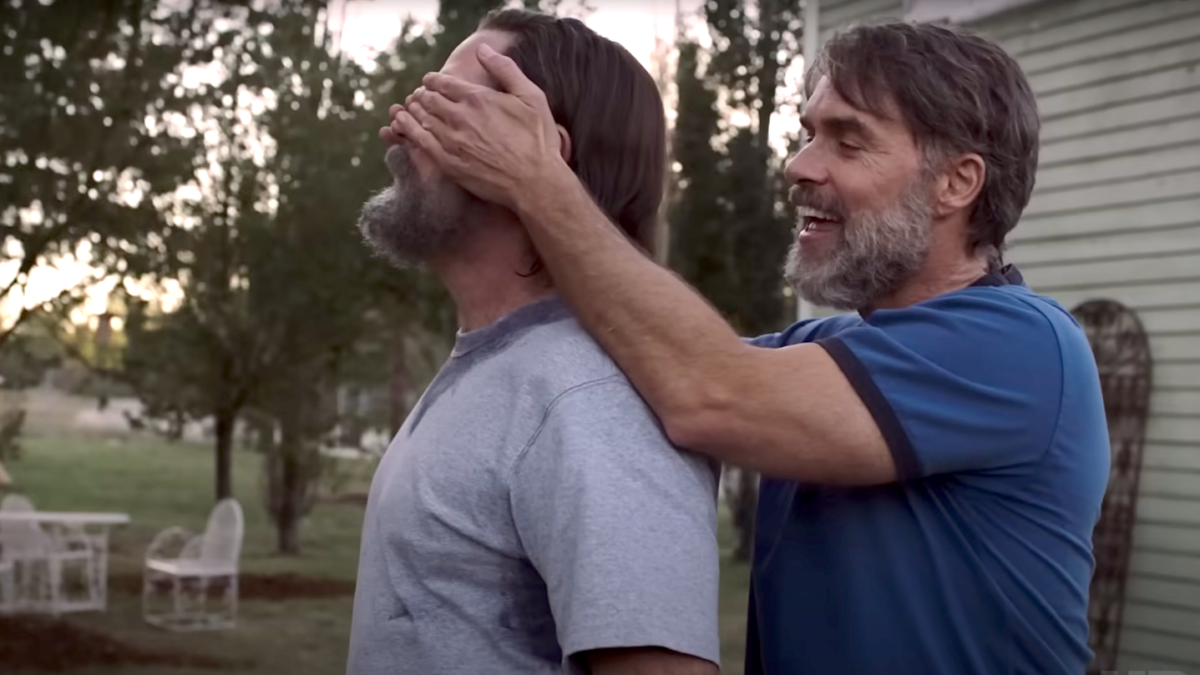After the first two episodes of HBO’s “The Last of Us” proved faithful to the eponymous video game, the third installment veered sharply from the source material in its portrayal of characters Bill (Nick Offerman), a cantankerous doomsday prepper, and Frank (Murray Bartlett), a refugee-turned-romantic partner. While opportunities for social and political commentary abound in the show’s post-apocalyptic setting, where government authoritarians use a health emergency to destroy even healthy people, the latest episode focused on a different theme: romanticizing suicide.
In the decade-old game, lead characters Joel and Ellie cross paths with Bill only briefly in their quest for supplies and survival, learning in that encounter that after Bill’s gay partner had become infected with the deadly cordyceps fungus, he took his own life. HBO’s retelling, however, lingered on the homoerotic backstory for the majority of its third episode.
For this to work, viewers were expected to suspend their logic. For instance, Bill’s declarations that Frank was his “purpose” and he wasn’t afraid of anything before Frank showed up are wholly unbelievable in light of the former’s obsessive prepping for fear of losing his freedom, his apparent passion for conservation and resourcefulness, and his love for his apparently deceased mother and her heirlooms.
That’s to say nothing of the dead end their homosexual relationship offers viewers. The same-sex pairing does nothing to further the plot, much less the dwindling human race. But the gratuitous gay plotline, ubiquitous in today’s entertainment landscape, was unsurprising and hardly the most offensive theme.
Warning: Spoilers ahead!
After detailing Bill and Frank’s tense meeting and subsequent 20-year stint as aging roommates and lovers, the episode shows a wheelchair-bound Frank with an elderly Bill as his caretaker. That’s when Frank announces abruptly that this will be his “last day.” He’s old, he’s had “bad days,” and he’s made up his mind: He’s going to die.
Worse, his death won’t be by his own hand. He’s tasked Bill with the responsibility of assisting his suicide, directing his life partner to cook him a final meal and then crush a handful of pills into his wine so he can die. When Bill protests tearfully, Frank manipulates him with, “Do you love me? Then love me the way I want you to.”
So that’s what Bill does. When the last shared meal is complete, Bill emerges from the kitchen with a bottle of wine, a pair of stemmed glasses, and a bag of crushed pills. Into Frank’s glass, Bill pours the fateful white powder and watches as his doomed lover drinks the concoction. Then as Bill quickly consumes his own pour, a knowing look washes over Frank’s face: Bill had laced the entire bottle with enough drugs “to kill a horse.”
It’s then Bill’s turn to voice his reasons for wanting to die, none of which would have materialized without Frank’s death wish. Frank responds with a line that encapsulates the message of the entire episode:
I do not support this. I should be furious. But from an objective point of view, it’s incredibly romantic.
The pair break into tragic laughter, and Bill wheels Frank to their bedroom, where they fall into irrevocable sleep off-screen.
Fact Is Worse Than Fiction
Media devoured the episode with predictable fawning, extolling the “Achingly Beautiful Gay Love Story” and saying it “made an early claim to one of the best TV episodes of 2023.” But while attempting to be an apocalyptic, homosexual echo of “Romeo and Juliet,” the episode came off less Shakespearian and more Canadian MAID advertisement.
Assisted suicide is an age-old ethical dilemma — is it always wrong to kill someone if he asks you to? But in championing so-called “medical assistance in dying” (MAID), governments have decisively picked the mortal side. Once humans have warmed up to the culture of death with the drip-drip of abortion — from “safe, legal, and rare,” to preborn murder as a form of birth control, to eugenics — it’s easy to sell them on compassionate killing.
Canada is leading the charge. In less than two months, Canadians as young as 18 with no physical ailments will be able to acquire assisted suicide for “mental illness.” They can already be killed upon request if they have an infirmity that can’t be fixed in a manner they deem acceptable, but the regulations leave the door wide open for death on demand: Citing disabilities, people can get the green light for euthanasia based on homelessness, poverty, or an inability to receive health care.
Sixty-five-year-old Les Landry has been approved to die under Canada’s MAID program, thanks to his wheelchair, diabetes, and other non-life-threatening disabilities. But poverty and the threat of homelessness are the real driving forces behind his decision to seek state-sanctioned suicide.
He’s been forthright about the fact that he doesn’t want to kill himself, but in today’s culture of death, the powers that be make it more appealing to die than to live. Doctors stopped making house calls years ago, Landry observed, but “they’re willing to do a house call to kill you.”
You Don’t Know What Love Is
Closer to home, Hollywood adds fuel to this fire by portraying death on one’s own terms as “incredibly romantic.” Storytelling has immense power to shape perceptions of the good, and sometimes the most poignant way is to show the darkness of the bad.
Objectionable themes such as unnatural or unfaithful sex, drugs, or murder can positively shape the viewer by dealing honestly with the consequences. When Walter White poisons an innocent child to manipulate his on-again-off-again meth-cooking business partner, there’s no doubt about who’s the bad guy.
If “The Last of Us” had dealt honorably with suicide, it might have portrayed Bill as unflinching in his commitment not to kill the person he claimed to love, Frank taking his own life anyway, and a devastated Bill scrambling to clean up the pieces of life after death. Instead, it sent the dark message that assisted suicide is justified and romantic, and it fed the carnal notion that “love” adapts to whatever self-serving definition we assign it. Adoring media agreed.
If the writers of “The Last of Us” and the characters they created truly understood love, they might have considered a different road. By sacrificially laying down their own desires instead of selfishly taking their lives, Bill and Frank could have provided friendship to Joel and Ellie — who needed companionship as much as they needed a truck and showers — and literally helped save the world.
Instead, they killed that possibility, and called it good.









